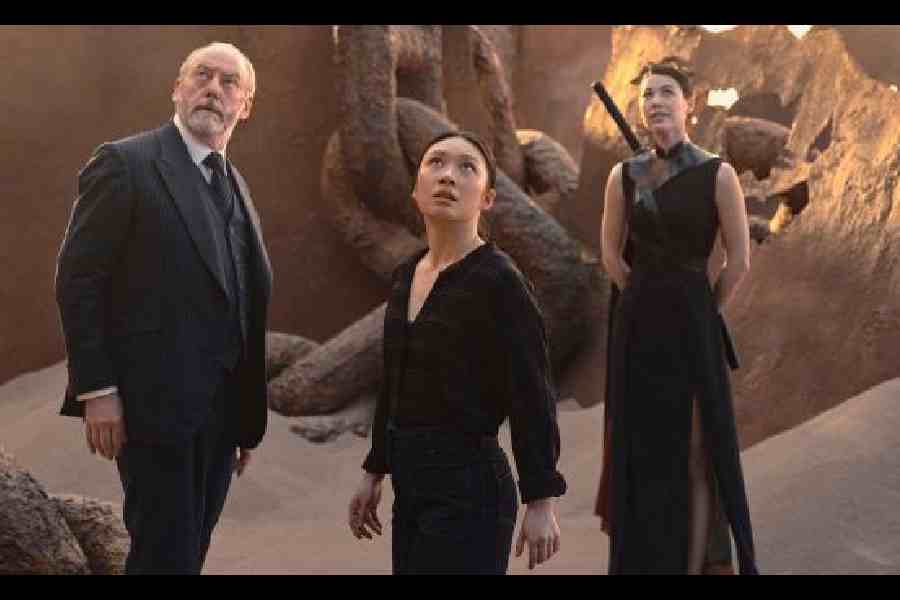Links and loops, each interlinked inextricably and in a manner so complex that you will be left oscillating between extreme emotions of scratching your head in disbelief or throwing up your hands in a state of euphoric ‘eureka’ abound in 3 Body Problem. The new Netflix sci-fi watch — which encompasses far more than the narrow definition of its genre — is an eight-episode series which is partially successful in translating onto screen what is regarded as one of the most unfilmable books — Cixin Liu’s The Three-Body Problem, an imaginative and engaging sci-fi novel that seamlessly blends science and history with a riveting story. It is a densely packed read with details of China’s Cultural Revolution and its after-effects and combines physics, astronomy and computer science. And, of course, it has aliens.
That 3 Body Problem, the series, comes from David Benioff and D.B. Weiss is hardly surprising. The duo has been responsible for bringing to screen a cult TV series based on what is widely regarded as a series of unfilmable books. We know it as Game of Thrones.
3 Body Problem is based on the first novel of Liu’s Remembrance of Earth’s Past trilogy. The ‘three-body problem’ is a conundrum in astronomy and mathematics that describes why it is often difficult to predict the long-term trajectory of planets, moons and stars.
The crux of the story, and just one angle of it, is that an alien race — called the Trisolarans or San-Ti Ren — is headed to earth to colonise it. Though they won’t land earlier than 400 years, through intergalactic communication, these ‘travellers’ attempt to intimidate human scientists into slowing down our technological advancement, making earth easier to conquer. One of the most chilling warnings of their intentions comes in Episode 5 — perhaps the most compelling episode of the series — where the world, from London’s Piccadilly Square to New York’s Times Square, is taken over by alien technology to mock humankind and label us as ‘bugs’.
3 Body Problem hits the ground running, opening with a harrowing scene of an eminent professor of physics being publicly executed by Chinese Cultural revolutionaries for teaching the principles of Western science. His daughter, who also happens to be his protege, looks on appalled. What follows is one timeline that follows her as she is sent first to a forced labour camp in Mongolia and then, when her astrophysicist skills are needed, to a mysterious scientific project. This is in the 1960s.
A parallel timeline in the present shows particle accelerators around the world going ‘rogue’ even as scientists inexplicably start killing themselves. These “suicides” are being investigated by ex-cop Da Shi (Benedict Wong) whose boss Thomas Wade (Liam Cunningham, Game of Thrones’ Davos Seaworth) starts off being a shadowy figure heading a super-secret project and then comes into the centre when the world as we know it starts falling apart.
Wade’s path crosses that of hot-shot scientists Jin (Jess Hong) and Auggie (Eiza Gonzalez). The duo, along with their three friends, come into the picture when one of the scientists who kills herself happens to be their mentor.
All eight episodes of 3 Body Problem demand your unwavering attention and in-distractable patience. That is easier said than done because the show (Alexander Woo is also credited as creator along with Benioff and Weiss) doesn’t simplify things. In fact, matters became even more complex as the episodes roll out and chances are that you will either be inexorably sucked into what is happening or be bamboozled enough to tune out halfway, or even earlier. This is, without a doubt, an extreme show that arouses extreme impulses.
For someone like me for whom sci-fi is never the first choice for a watch, 3 Body Problem’s seamless blend of storytelling and spectacle is impressive. I am aware that fans of the book aren’t all that happy with the Netflix adaptation but for me, the fact that someone even attempted to tell a story this mind-bending is worth more than a few claps.
3 Body Problem’s epic canvas spans multiple decades, while also reaching centuries into the past and future. And while it can hardly be faulted for lack of ambition, it can’t be denied that at many points, there is so much packed in that even readers of the book will find it hard to keep up or, more importantly, remain invested in.
But to give credit, the existential crisis explored in the series, and the possible human responses to it, feel more relevant than ever after living through a global pandemic and more significantly, in the age of artificial intelligence threatening to make humankind redundant.
That Season One only lays the groundwork (“the aliens are closer than you think!”) for a more complex narrative that will traverse and converge time and space across centuries is evident. And despite the flaws of the first season, we recommend you stay on with the series and the plentiful it has to offer next. After all, the universe has only just winked.
Which is your favourite sci-fi series? Tell t2@abp.in











